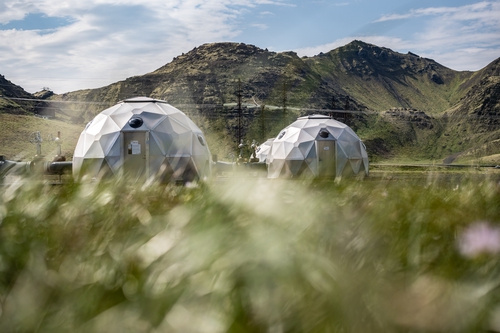Carbfix
Carbfix is the world’s first CO2 mineral storage operator, capturing CO2 and turning it into stone underground in less than two years, providing a natural and safe carbon storage solution.
Climate change is most of the pressing challenges of our time. Elevated concentrations of CO₂ and other greenhouse gases contribute to increased climate volatility, including extreme weather events, accelerated glacier melt, and heightened wildfire risk. Addressing climate change requires both the reduction of carbon dioxide (CO₂) emissions (e.g., the burning of fossil fuels) and the active removal of legacy CO₂ from the atmosphere. While biological carbon sequestration via forests and vegetation plays a role, a significant portion of Earth’s carbon is naturally stored in geological formations. Carbfix leverages proprietary technology to imitate and accelerate this natural mineralization process, providing a safe and permanent carbon storage solution.

Carbfix dissolves CO2 in water and injects deep into the subsurface where it forms minerals in under two years. It is injected into favorable rocks, such as basaltic rocks, which are reactive and porous. The carbonated Carbfix water reacts with the basaltic rocks releasing metals such as calcium, magnesium, and iron. Over time, these metals combine with the dissolved CO2 and form carbonates, filling up the empty space within the rocks. The carbonates are stable for thousands of years and can thus be considered permanently stored.
Carbfix originally started as a collaboration between Reykjavík Energy, the University of Iceland, CNRS in Toulouse, and Columbia University in 2007. Since then, many universities and research institutes have collaborated with Carbfix, through various EU projects. The first pilot injections were conducted at Hellisheidi geothermal power plant, in 2012, where over 95% of CO2 injected was mineralized to carbonate minerals in less than two years. The Carbfix technology has been an integral part of the operations at the Hellisheidi power plant since 2014 and reduced its CO2 emissions by 30%. With project Silverstone, an EU-funded project, that will deploy fullscale CO2 capture, injection, and mineral storage coming into operation in 2025, Hellisheiði power plant will become one of the world’s first near-zero carbon footprint geothermal powerplant. The Silverstone project alone will deliver 10% of what Iceland’s Climate Action Plan calls for, by the year 2030, within energy and industrial sectors not covered by EU ETS. In 2023, pilot injections at Nesjavellir geothermal power plant started with about 20% reduction in the plant’s annual emissions. The Carbfix technology can be adapted to other industries with hard to abate emissions, such as steel, iron, and cement production.
Since 2017, Carbfix has worked in collaboration with Climeworks, a Swiss company specializing in direct air capture (DAC) technology. Climeworks and Carbfix developed a small DAC and injection pilot plant that captured CO2 from the air and injected into the subsurface for mineralization. Climeworks has since then upscaled and now operates two DAC plants in Hellisheiði, Orca and Mammoth. Carbfix injects and mineralizes the captured CO2 from both both DAC plants. Hellisheidi is the only place in the world where CO2 is captured directly from the atmosphere and sequestered.
On January 1st, 2020, Carbfix was founded as an independent subsidiary by of Reykjavík Energy. The company’s mission is to significantly contribute to climate recovery through the worldwide scaling of underground CO₂ mineral storage. Research and development are at the heart of Carbfix’ operations, and the company developes and participates in many interesting projects. Seastone, for example, is a research project where Carbfix, in collaboration with universities and research institutes in Switzerland, UK and Iceland, perform the world’s first injection of CO2 dissolved in seawater. Other research projects include Ankeron, a carbon management hub in the US, and Hero Basalt, a regional geologic model in the Columbia River Basalt in the US. Carbfix also operates pilot projects exploring different rock types through the GECO project in Italy, Turkey and Germany.
The biggest Carbfix project is the Coda Terminals project. Coda Terminals are the result of Icelandic ingenuity in the form of a new industry that will have a significant positive impact on the climate. Coda Terminals will receive carbon dioxide (CO₂) from parties who wish to permanently sequester CO₂ generated by their production. CO₂ will be transported to Iceland with specially designed ships, but it will also be possible to sequester CO₂ captured directly from the atmosphere and from domestic industry. Coda Terminal will demonstrate that Carbfix's technology can be scaled up significantly to achieve a greater positive impact for the climate.